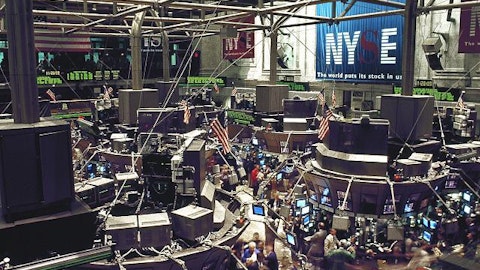Below are billionaire David Tepper’s top 5 stock holdings. For a comprehensive list see Billionaire David Tepper’s Top 10 Stock Holdings.
5. Facebook (NASDAQ: FB)
The shares of social media giant Facebook (NASDAQ: FB) performed well during the pandemic year due to social distancing policies. Appaloosa Management has been holding Facebook’s position since 2016 and it appears that the hedge fund has benefited from its investment. This is because shares of Facebook grew 27% in the last twelve months, extending the five years gains to 186%. It is the fifth-largest stock holding of David Tepper’s hedge fund, accounting for 8.18% of the overall portfolio.
A global asset management firm Oakmark Funds, which returned 24.44% for the fourth quarter, highlighted few stocks including Facebook in an investor’s letter. Here is what Oakmark stated.
“Facebook currently sells at approximately $273 per share or 26 times consensus 2021 earnings estimates of $10.47 per share. That might not seem excessive for such a high-quality company, but it certainly would not meet our value criteria if that was the whole story. But it’s not. For starters, Facebook is expected to have $29 per share of cash at the end of 2021, and, as we all know, cash currently earns almost nothing. Subtracting cash from the stock price, we are only paying $244 per share for the business or 23 times earnings.
There is more. Analysts believe that WhatsApp, a popular messaging service owned by Facebook, reports a GAAP loss, yet its subscribers have quadrupled since Facebook acquired the service in 2014. If WhatsApp‘s current subscriber base was valued at the same price-per-subscriber as in 2014, it would now be worth $31 per Facebook share. Using analyst forecasts for revenue several years out, that $31 per share seems reasonable as it roughly matches Facebook’s current price-to-sales multiple.”
4. Micron Technology (NASDAQ: MU)
The chipmaker Micron Technology (NASDAQ: MU) is the fourth largest stock holding of Appaloosa’s 13F portfolio, accounting for 10.17% of the portfolio. Shares of Micron rallied close to 40% in the last twelve months. The hedge fund has been holding its position in the chipmaker since 2016 and raised its stake by 31% in the September quarter of last year.
Bonsai Partners, which return of 63.3% for the third quarter, claimed in an investor’s letter that Micron is an attractive stock pick. Here is what Bonsai Partners stated:
“If there’s one investment mistake I’ve made multiple times in my career it’s accepting lower quality businesses available at attractive prices. I hope I’m not repeating this mistake again with Micron. Acquiring a low-quality business at a great price usually does not lead to great investment returns, but neither does a great business at a low-quality price. You have to have both to earn superior returns.”
3. T-Mobile US, Inc. (NASDAQ: TMUS)
Communication services company T-Mobile US, Inc. (NASDAQ: TMUS) has generated big gains for David Tepper’s hedge fund in 2020. This is because the hedge fund is holding a big position in T-Mobile US and its shares rallied almost 60% in the last twelve months. TMUS is the third-largest stock holding of Appaloosa Management, accounting for 10.54% of the overall portfolio.
Oakmark Funds, which returned 23% for the second quarter, highlighted the confidence in T-Mobile US in an investor’s letter. Here is what Oakmark Funds stated:
“We initiated a position in T-Mobile after the company announced that regulators would approve its merger with Sprint. AT&T and Verizon have long dominated the market for wireless services due to their incumbent network quality advantage. The recently closed merger of T-Mobile and Sprint creates the first opportunity for a challenger to build the fastest, most reliable and highest capacity wireless network in the United States. We believe the impact of this combination will be non-linear from not only a network perspective but also a financial one. Our long-term investing horizon enables us to look several years ahead to assess the benefits of scale, synergy and low-incremental cost growth, which should generate more subscribers, faster revenue growth and higher margins. We like that the company will be led by veteran T-Mobile managers who have successfully integrated previous acquisitions and have gained impressive market share, despite a previously inferior network. A secondary offering by a large, non-economic seller gave us the opportunity to purchase our stake at a below market price.”
2. Alibaba Group Holding (NYSE: BABA)
The Chinese e-commerce giant Alibaba Group Holding (NYSE: BABA) is the second-largest stock holding of Appaloosa Management. The hedge fund has initiated a position in BABA in 2017 and it accounted for 11.54% of the portfolio. Shares of Alibaba soared almost 22% in the last twelve months.
Aikya Investment Management, which returned 21% for the fourth quarter, highlighted the confidence in the growth prospects of Alibaba in an investor’s letter. Here is what Aikya Investment Management stated:
“Our long-term predictions suggest Alibaba can generate $60 billion of free cashflow in 2030. Working in the assumption that Alibaba will be a much more mature business in 2030, we would expect our investment to at least generate a 5% free cash flow yield. This implies Alibaba should be worth $1.2 trillion in 2030, and if we then factor in appropriate adjustments to the share count for share-based compensation then we would expect to earn a 3% return in dollars from today’s share price.”
1. PG&E Corporation (NYSE: PCG)
David Tepper’s hedge fund has been holding a position in PG&E Corporation (NYSE: PCG) since 2017 and it was the largest stock holding of Tepper’s portfolio at the end of the September quarter. The hedge fund has raised its stake by 803% in the September quarter to 13.41% of the overall portfolio. Shares of PG&E Corporation underperformed in 2020.
Baupost Group has highlighted few stocks including PG&E Corporation in an investor’s letter. Here is what Baupost Group stated:
“Fortunately, our investment in the subrogation claims and equity of Pacific Gas and Electric, the firm’s largest position, was not impacted by the COVID-19 fallout. As we expected, PG&E’s bankruptcy plan was confirmed by the judge overseeing the case, and the company emerged from bankruptcy on July 1st. Importantly, upon emergence, cash was placed in a trust for the benefit of the subrogation creditors. A substantial initial distribution from this trust, estimated to be roughly 80% of anticipated recoveries, is expected to be paid later this month.”
Please also see 10 Biggest Quant Funds in The World, 11 Best Quantum Computing Stocks To Buy Now and Billionaire Lee Cooperman’s Top 10 Stock Picks.





